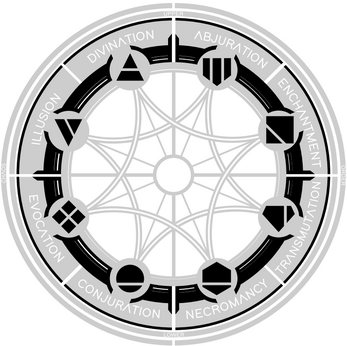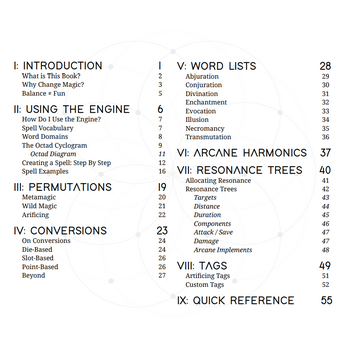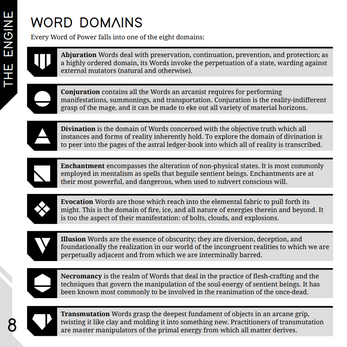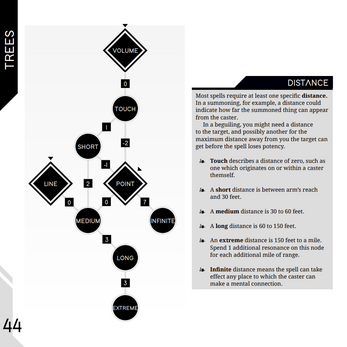THE POWER WORDS ENGINE
A downloadable toolkit
The Power Words engine is a custom magic spell generation tool designed to replace the spell list of your favorite tabletop system.
This digital package contains a PDF of the Power Words Engine (63 pages) in page and spread formats, which include everything you need to integrate the Engine into your system of choice, as well as a suite of printable templates for making cards for Engine spells. 1000+ Words of Power, detailed step-by-step instructions on making spells, conversion commentary, plus rules for metamagic, wild magic, and artificing.
❦ ❦ ❦
Choose a set of up to 8 Words from the provided lists, which combine to describe your spell’s effects. For example, if you wanted to make a spell that causes a ball of fire to erupt from your hands, you might choose the words Orb and Fire. These are just words; as long as they describe the effect you want, they can be used to create that effect.
Next, calculate the spell’s resonance by comparing its Words to a set of rules, called harmonics; the more harmonics the spell's Words follow, the more powerful the spell can be.
Then spend resonance on trees and tags, which nail down the spell's specific mechanics where applicable: damage, range, duration, and casting time, for example.
❦ ❦ ❦
Orb of Fire is the tip of the iceberg. With over a thousand Words at your disposal, you'll be able to use the engine to create spells like Commune with Internal Evil, Indomitable Sight of the Iron Guardian, or Shatter Mark of Darkness.
| Status | Released |
| Category | Physical game |
| Rating | Rated 4.9 out of 5 stars (9 total ratings) |
| Author | nuclearobelisk |
| Genre | Role Playing |
| Tags | Magic, pdf, Tabletop |
Purchase
In order to download this toolkit you must purchase it at or above the minimum price of $7 USD. You will get access to the following files:
Exclusive content
Support this toolkit at or above a special price point to receive something exclusive.
Community Copies
Feel free to take a community copy of the Engine if you need to. Purchases add community copies 1:1.




Comments
Log in with itch.io to leave a comment.
This kind of system is what I was looking for, thank you! I have aquestion:
I intend that my players are able to create spells during play and I would need them to have a spell effect defined in like 10-20 seconds. How could I achieve this? Do you recommend that I ignore Harmonics and use a fixed resonance number per Word used? I could maintain the complete rules with Harmonics etc for prepared spells but I also need a lite version for improvised ones.
Also, how do you recommend that players learn new Words? How many Words should a starter player know? Should a player be able to learn Words from any Domain?
I'm confused, how dose the detriment rule apply to damage? It says it dose but doesn't explain how, at least from what I can tell.
Are you talking about negative damage, as in healing? If so is DM fiat the only thing keeping someone from making OP healing spells? I know this system isn't strict about balance, but still...
Or do you mean damage that hurts the caster and maybe even their allies? That makes more sense.
I've been using this for a character I am using in a Pathfinder 2e game. The GM has been very loose with the limitations on it but I am looking for a little insight on how this is supposed to work. For a Cantrip, that is a level 0 spell it would have no words. How does that work? Furthermore it says that you can only have as many harmonics as the number of words but for a 2nd level spell the power is 11-18(it says 11-25 for 2nd-3rd level so I averaged it out for 2nd.) With only 2 harmonics how does one make it to this level? I feel like I am missing something here that I am supposed to be using to increase the spells limits. Are there more harmonic options I am not aware of or am I missing a step here? I am really enjoying the spells I am making using this book but I'm just a bit confused at this point due to this limitation.
Under the slot-based conversion on pg. 26, cantrips aren't a thing. If that's breaking for your game, dispense with the "spells’ levels are equal to the number of words in the spell" rule, and use the table on pg. 15 as a guide for leveling your spells.
The Detriment Rule (pg. 42) can get you more resonance out of a spell outside of the harmonics; there are ways to optimize your harmonics up to the levels described by the chart on pg. 15, but the Detriment Rule is an easy way to do it without sweating too much over them.
I read through the entire PDF and love the ideas it presents. However, I have a few questions.
Blaze Beam, which isBlaze (= Flames?, Evocation) Beam (Conjuration)Swift Steed, which isQuick Steed (both Conjuration)Bee Bell, which isInsect Bell (both Conjuration)1 . Call it a CC BY-SA license.
2. The words I printed in the book are meant to be used as examples, but I'd be careful about allowing synonyms with no constraints, as that could potentially drastically affect how players approach harmonics. I would allow only "synonyms" that significantly increase the specificity of the word listed, so Insect -> Bee would be fine but Flame -> Blaze would be a little dicey. Beyond that, players could be allowed to rename their spells however they like so long as that name doesn't affect the underlying words used or the "flavor" they evoke. Like, if a player wanted to say that the spell made from (i.e. harmonics were calculated from) the words "flame" and "beam" is called "Blaze Beam" because it sounds cooler, that's fine.
3. It's true that d4's are optimal for most implementations of spell damage (more accurately, when seeking to maximize the average roll total to harmony ratio). The Detriment Rule is the main reason for other die sizes' inclusion in the damage tree. In general, this tree will vary greatly in use case from system to system, just because HP/player resource systems in general vary pretty widely.
I love the concept of using words to weave a spell, as it fits into my campaign world that already allows spellcasters to weave spells into new spells. Your system nicely dovetails to augment this rather nicely. Two questions/comments:
1. Saxophone seem oddly specific and out of place compared to other Conjuration words that broadly encompass items. Wouldn't a Instrument be more appropriate? Likewise for Hammer, when Tool may be a better word for broader coverage. Blade should already cover Sword and even Knife, which frees up word slots for other words.
2. In the Resonance Trees, there are X used in several places. I assume that means the GM is expected to assign a value.
With the Kickstarter wrapped and copies shipped. Are there any print copies available for non-KS purchases?
No plans for an additional physical release right now, but a limited run somewhere down the line is possible. The best place to look for updates will be on my twitter @nuclearobelisk
Beautiful game! I will definitely be using this in future campaigns.
Question however: the explanation for the die-based casting system and the example appear to conflict with each other (pages 24-25). Could I get some clarification on when to remove dice?
Thanks!
Thanks! And you're right that that description is inconsistent: you'd remove dice when A) the sum of the result is less than the spell's resonance (you'd remove all the dice in this case) or B) when the result on a single die is higher than the average roll for whatever die you're using (you'd just remove that die in this case). That said, the content of the engine doesn't particularly care whether you use "higher than average" or "lower than average" in case B. I would recommend the former over the latter in cases where your implementation/interpretation of some of the resonance trees is scaling other effects off the result of the casting roll.
Ah, thank you for the clarification!